
Domenico Modugno was an Italian singer, songwriter, actor, guitarist, and later in life, a member of the Italian Parliament. He is known for his 1958 international hit song "Nel blu dipinto di blu", for which he received Grammy Awards for Record and Song of the Year. He is considered the first Italian cantautore.

Franco Franchi was an Italian actor, comedian and singer.
Francesco Ingrassia was an Italian actor, comedian and film director.

Dr. Goldfoot and the Girl Bombs is a 1966 Eurospy comedy film, made in Technicolor and directed by Mario Bava. Serving as a sequel to two unrelated films, Dr. Goldfoot and the Bikini Machine and Two Mafiosi Against Goldginger, the film stars Vincent Price, Fabian, Francesco Mulé, Laura Antonelli, and the Italian comedy team Franco Franchi and Ciccio Ingrassia.
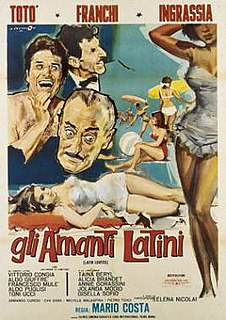
Latin Lovers is a 1965 Italian comedy film directed by Mario Costa.

Kaos is a 1984 Italian drama film directed by Paolo and Vittorio Taviani based on short stories by Luigi Pirandello (1867–1936). The film's title is after Pirandello's explanation of the local name Càvusu of the woods near his birthplace in the neighborhood of Girgenti (Agrigento), on the southern coast of Sicily, as deriving from the ancient Greek word kaos.
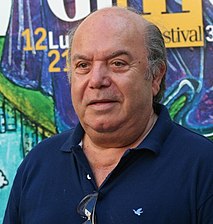
Lino Banfi is an Italian film actor and presenter. He has appeared in more than 100 films since 1960.

Two Mafiosi Against Goldfinger or Due mafiosi contro Goldginger is a 1965 Italian Spanish international co-production Eurospy comedy film directed by Giorgio Simonelli. It is a spoof of the 1964 James Bond film, Goldfinger. It was picked up by American International Pictures and dubbed into English to be shown on their AIP-TV movie package as The Amazing Dr. G or Two Crazy Secret Agents.
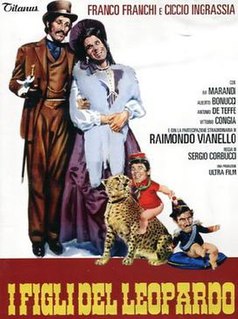
I figli del leopardo is a 1965 Italian comedy film directed by Sergio Corbucci that is a parody of The Leopard.

Franco and Ciccio were a comedy duo formed by Italian actors Franco Franchi (1928–1992) and Ciccio Ingrassia (1922–2003), particularly popular in the 1960s and 1970s. Together, they appeared in 116 films, usually as the main characters, and occasionally as supporting characters in movies featuring well-known actors like Totò, Domenico Modugno, Vittorio Gassman, Buster Keaton and Vincent Price.

Caprice Italian Style is a 1968 Italian comedy film directed by six different directors, including Mario Monicelli and Pier Paolo Pasolini. The film starred both Totò and the comedy team of Franco and Ciccio.

Captain Fracassa's Journey is a 1990 Italian comedy film directed by Ettore Scola. The film is based on the 1863 novel Captain Fracasse by Théophile Gautier. It was entered into the 41st Berlin International Film Festival.
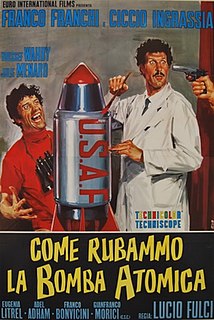
Come rubammo la bomba atomica or How We Stole the Atomic Bomb is a 1967 Italian-Egyptian international co-production Eurospy comedy based on the 1966 Palomares B-52 crash. Filmed in Italy and Egypt, it stars the Italian comedy duo of Franco and Ciccio and was directed by Lucio Fulci. The film features a teaming of parodies of famous film secret agents.

The Swindlers, aka Los Mangantes, is a 1963 Italian comedy film written and directed by Lucio Fulci, starring Franco Franchi and Ciccio Ingrassia.
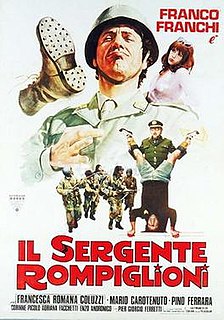
Il sergente Rompiglioni is a 1973 Italian comedy film directed by Giuliano Biagetti. The film got a great commercial success, grossing over one billion lire. It was the greatest commercial success of Franco Franchi in his solo career after the split from Ciccio Ingrassia. The film has a sequel, Il sergente Rompiglioni diventa... caporale, still starring Franchi in the title role.

Nino Terzo was an Italian actor.

Paths of War is a 1970 Italian western-comedy film directed by Aldo Grimaldi.

The Adventures of Pinocchio is a 1972 Italian five-part miniseries directed by Luigi Comencini, which originally aired weekly on Rai 1 between April 8 and May 6, 1972. Based on Carlo Collodi's 1883 novel with the same name, the miniseries got a large critical success, and had an average of twenty-one and a half million viewers during its first airing. All the episodes together make up 280 minutes of runtime.
Ciprì & Maresco is the name used by the pair of Palermo-born Italian screenwriters and directors Daniele Ciprì and Franco Maresco.
This page is based on this
Wikipedia article Text is available under the
CC BY-SA 4.0 license; additional terms may apply.
Images, videos and audio are available under their respective licenses.

















